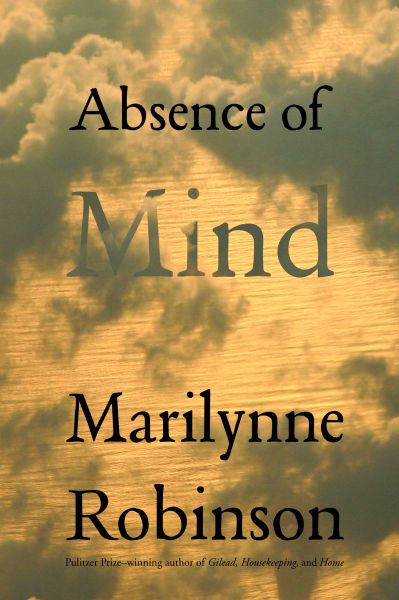Marilynne Robinson, Absence of Mind: The Dispelling of Inwardness from the Modern Myth of the Self (Yale University Press, 2010). 140 pages.
When my colleague and friend Jenn Craft suggested that I review Marilynne Robinson’s Absence of Mind for Transpositions, I thought she was playing a clever joke on me. I am someone you would describe as absent-minded. Robinson’s book has little to do with those among us who are hopelessly distracted, but there may be something to glean from this comical connection. Like the absent-minded, Robinson diagnoses the modern western world as suspicious of the human mind. The mind might play all sorts of tricks upon us; it may present us with any number of red-herrings, lead us down a maze of rabbit trails, send us on a wild goose chase – all the while, we are distracted from what is really happening. Robinson’s thesis concerning modernity is familiar: secularism leads to a world that is disenchanted (she prefers ‘de-mythologized’), and we need a way to recover a place for subjectivity, that mysterious sense of self.
Robinson may be most well-known for her novel Gilead (2004), and it is both interesting and appropriate that a writer of fiction should take on such a massive intellectual issue as the disenchantment of the modern world. She is, by profession, a myth-maker, and myths are indisputably a product of the human mind.
Throughout Absence of Mind, Robinson sets her gaze upon another group of myth-makers that she categorizes as the “parascientific.” This genre is well known to us today in the names of Richard Dawkins, Daniel Dennet, Geoffrey Miller, Steven Pinker, and E. O. Wilson. But Robinson is attentive to the parascientific as a modern tradition, and so she also draws upon the work of August Comte, William James, Herbert Spencer, Oswald Spengler, and, most importantly, Sigmund Freud. What distinguishes the scientific from the parascientific is the latter’s departure from the scientific method coupled with an appeal to the authority that this method has, justly, garnered for itself. Thus, these writers borrow insights from evolutionary biology, psychology, genetics and other disciplines to answer questions (such as what is a human being?) that are simply precluded from the scientific method. The parascientific ushers the scientist into the realm of the philosopher and theologian, and Robinson is especially concerned to undermine positivism, which is the metaphysics of the parascientific.
The core of her book is a very careful, and persistent, questioning of the modern myth of human nature as self-interested. In her chapter “The Strange History of Altruism,” she notes the difficulty that parascientific literature has with truly selfless behaviour. According to Robinson, many contemporary writers in the parascientific genre, such as E. O. Wilson, subject altruism to evolutionary theory and so regard altuism as a deceit that masks self-interested behaviour. Robinson writes,
A central tenet of the modern world view is that we do not know our own minds, our own motives, our own desires. And – an important corollary – certain well-qualified others do know them. (59)
It is the scientist who is ultimately in position to tell humanity what they really want and who they really are.
Robinson makes a similar point in a chapter she devotes entirely to Freud. She interprets Freud in a fascinating way by placing him in his context as a Jew within the volatile social and political landscape of early twentieth century Austria. Freud’s psychology, focusing upon the power of innate drives such as procreation and “the pleasure principle,” is seen by Robinson as a reaction against racial interpretations of human nature common in Freud’s day. Like those thinkers in the previous chapter, Robinson notes that Freud’s psychology is deeply suspicious of the mind because its basic desires are largely unknown to the modern individual.
In her final chapter, Robinson makes an eloquent plea for the life of the mind or soul, and all those things, such as art and religion, that go along with it. A consistent theme running through this chapter is the sense, after reading parascientific literature, that the brain and the cosmos are too arbitrary and meagre to support the lofty aims of the human mind in its quest for truth:
On one hand we have the most ancient and universal theological intuition, that the order we see exists by divine fiat, that the heavens proclaim the glory of God. And on the other hand we have this late development in cosmological speculation, the notion that the reality we experience is arbitrary, being one manifestation of an infinitely greater potentiality. (122)
The Anglican priest and theologian W. H. Vanstone classified this apparent incongruity as the ‘problem of disproportion,’ and I prefer his suggestion – I wonder if Robinson would as well – that the life of the mind only makes sense if the cosmos is the loving work of a God who creates value in the even the lowliest of things.
If I have one disappointment with Absence of Mind, it is the lack of a constructive argument. Robinson is typically on the defensive, even if her writing is both penetrating and insightful. Her critique of positivism is certainly not the first of its kind, but it is a wonderful and helpful piece of clear thinking. Perhaps I can hold out hope that Absence of Mind is merely a prelude to a book that could be justly titled Presence of Mind.







Thanks for the review, Jim. Does she consistently interact with any particular theologians? If she doesn’t write the sequel, you have definitely stoked the fire for a fitting PhD project!
Hey Wes,
I don’t remember her interacting with any theologians. I think Calvin gets a brief mention. But it has been awhile since I read the book, and I don’t have it on hand. I think it is in the Roundel, so if you’re interested go take a look. I highly recommend the book, and it isn’t long, so why not give it a read?